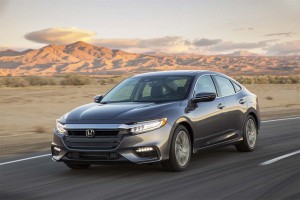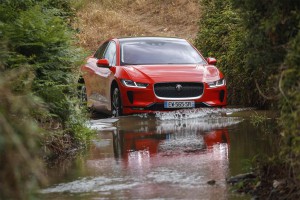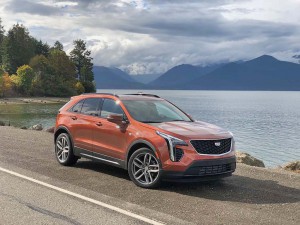
The 2019 Insight is Honda's third attempt to market a mainstream, entry-level hybrid: an a possible winner of Green Car of the Year.
Not all that long ago, motorists looking for an environmentally friendly vehicle were likely in for a long search, with only a handful of models on the market. These days, it’s becoming a lot easier, as more and more new alternatives come to market, seemingly almost every week.
And that’s convinced the organizers of the annual Green Car of the Year Awards to expand their program this year. “Green comes in many forms,” they explain, noting that this year will bring new awards for the Luxury Green Car of the Year and the Green SUV of the Year.
The three awards will be handed out at the Los Angeles International Auto Show just a month from now, and could see the jury highlight the wide range of “green” technologies now available to American motorists.
That’s been one of the notable facts of the Green Car awards. While some environmentalists prefer to focus solely on battery power, the program, created by Green Car Journal, highlights the wide range of alternative drivetrain technology now available. That includes not only hybrids, plug-in hybrids and pure battery-electric vehicles, or BEVs, but fuel-cell vehicles, advanced diesels and even conventional gasoline engines using new technologies to boost mileage and reduce emissions.
(Consumer Reports: Domestic reliability slipping. Click Here for the story.)
That said, the organizers noted in a release outlining the finalists for the three 2019 awards, “it’s evident how important electrification has become in today’s models, with two 2019 Green SUV of the Year finalists and all five finalists for the 2019 Luxury Green Car of the Year featuring battery electric or plug-in hybrid power.”

Jaguar's I-Pace's ability manage some off-roading activities is one reason why it's up Green SUV of the Year..
The winners will be chosen by a jury including Jay Leno; Jean-Michel Cousteau, president of Ocean Futures Society; Matt Petersen, president and CEO of Los Angeles Cleantech Incubator and board member of Global Green USA; Dr. Alan Lloyd, president emeritus of the International Council on Clean Transportation and senior research fellow at the Energy Institute, University of Texas at Austin; Mindy Lubber, president of CERES; and Jason Hartke, president of the Alliance to Save Energy.
Here’s a look at the 15 finalists, starting with the five up for Green Car of the Year:
Honda Insight. This marks the third-generation take on the Insight nameplate, this time Honda opting for a relatively mainstream design based on the familiar Civic platform and rated at 55 mpg Highway.
Lexus ES 300h. The sedan features a sporty new look, as well as the fourth-generation Lexus HEV driveline, here earning an EPA rating of 44 mpg Combined.
Nissan Altima. Nissan has not only updated the sedan’s design but also added technology like the semi-autonomous ProPilot Assist, as well as the industry-first variable-compression turbo engine.
Toyota Avalon Hybrid. The full-size sedan gets a major makeover for 2019 that includes a new, second-generation hybrid powertrain.
Volkswagen Jetta. While VW has quit the U.S. diesel market it’s offering high-mileage alternatives, including a seventh-generation Jetta using an advanced gas engine getting up to 40 mpg highway.
(Click Here to see why German automakers topped the Total Quality Awards — again.)
There should be little surprise that we’ll now see a new Green SUV of the Year award considering SUVs and CUVs now account for more than half of the American market. The five finalists are:
Cadillac XT4. The luxury brand’s first-ever compact SUV opts for a highly efficient turbo-four engine and further enhances mileage with its lightweight design.
Hyundai Kona. The Korean carmaker covers several bases with its smallest SUV, here offered with both a high-efficiency gas engine, as well as an all-electric package delivering 258 miles range.
Lexus UX. Like the luxury brand’s 300 sedan, this entry-level SUV is offered with two different driveline options, including both a gasoline driveline and a new hybrid dubbed the UX 250h.
Mitsubishi Outlander PHEV. The Japanese automaker is shifting emphasis to battery drivelines like this plug-in version of its latest-generation Outlander pairing a gas engine and two electric motors.
Volvo XC40. Volvo is migrating to a completely electrified drivetrain strategy. While the XC40 still offers all-gas options, it’s also available with the new plug-in Drive-E drivetrain package.
(To get details on why Toyota was rated as best automotive brand for 2018, Click Here.)
Luxury manufacturers are getting especially aggressive when it comes to adding battery-based models to their line-ups, in part because their buyers are more open to paying a price premium, but also because today’s long-range batteries can also enhance performance. Here are the five finalists:
Audi e-tron. The German marque is planning a broad array of all-electric models and takes its first step with this BEV alternative to its popular Q5, the e-tron offering over 200 miles of range.
Jaguar I-Pace. Already named Germany’s Car of the Year this week, the I-Pace has been winning raves for its mix of performance, styling and range of up to 240 miles per charge.
Porsche Cayenne E-Hybrid. While we won’t get Porsche’s first all-electric model, Taycan, until next year, this plug-in hybrid retains the brand’s focus on performance while driving up mileage.
Range Rover P400e. The new plug-in hybrid SUV aims to do it all: provide plenty of performance by pairing a gas engine with a 114 hp electric motor, while retaining the brand’s off-road capabilities.
Tesla Model 3. After a slow start, Tesla claims to be pumping out more than 6,000 of these compact sedans a week, helping to move all-electric technology into the heart of the U.S. market.

